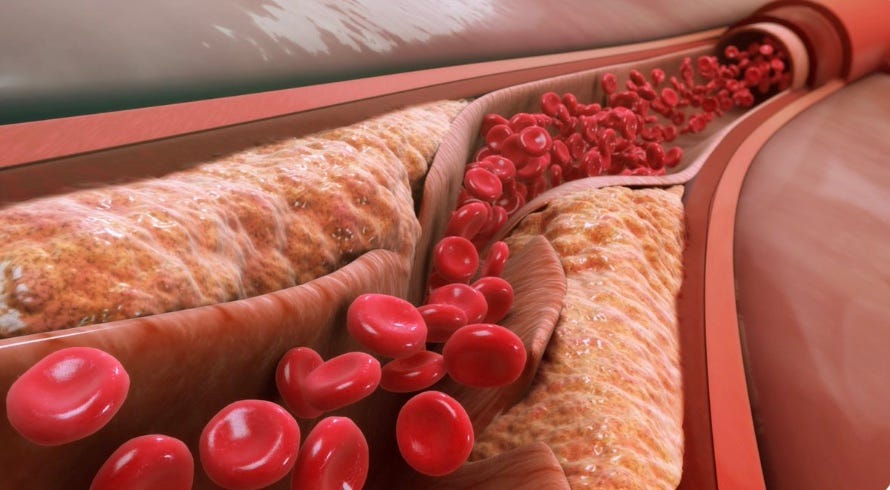Do Seed Oils Increase Risk of Heart Disease?
They were marketed to us as heart healthy "vegetable" oils, healthier than animal fats humans have consumed for millenia. Yet heart disease rates rose in spite of consuming more and more seed oils.
That said, actionable steps are absolutely helpful with the rationale. So by way of reminder, here’s a summary of what this newsletter has covered so far. You will improve your health if you do some fasting every day, eat more protein, especially red meat and eggs, avoid all seed oils, increase saturated fat intake, increase salt, get more sunshine, greatly reduce your intake of ultra-processed foods, and do mostly the opposite of whatever the mainstream health messaging is telling you to do. 🤪
But what about the environment? Isn’t eating meat bad for the environment and consuming plants good for the environment? By “plants,” do you mean consuming genetically modified, mono-cropped, pesticide-covered soy protein that’s highly processed in a factory using fossil fuels and transformed into “Beyond Meat?” Is that somehow better for the environment than a cow eating grass? 🤣
Do Seed Oils Contribute to Heart Disease?
Seed oils have long been promoted as the heart-healthy alternative to animal fat since many used to believe that saturated fat and cholesterol caused heart disease. However, that old hypothesis is crumbling under the weight of new data. (For a full discussion, see this post on saturated fat, this post on heart disease risk factors, and this post on statins.)
Now, many researchers are proposing that the previously dubbed “heart-healthy” seed oils could actually be significantly contributing to heart disease instead of helping.
Drs. James DiNicolantonio and James H O’Keefe published an article in 2018 in the British Medical Journal called “Omega-6 vegetable oils as a driver of coronary heart disease: the oxidized linoleic acid hypothesis.”
This article is well-documented and references 66 other studies. For anyone interested, I recommend reading it in full since it’s relatively easy to follow.
Here is a quick summary of the article:
You eat vegetable oils ➡️ these unstable oils enter your lipoproteins ➡️ these lipoproteins, especially LDL, get oxidized, aka transformed into harmful substances because vegetable oils are unstable ➡️ your body now recognizes this oxidized LDL as a harmful substance ➡️ it sends a macrophage (white blood cell) to engulf oxidized LDL ➡️ this process increases inflammation and plaque as the macrophages die.
Here are the main points in the researchers’ own words:
First Point:
LDL [has] to become oxidised first in order for atherosclerosis to develop.1
In other words, high LDL is only a problem if it’s damaged. Healthy LDL can be high and not cause heart disease.
Second Point
Oxidised LDL (oxLDL) cause[s] direct toxic effects to the cell, recruitment and entry of monocytes [white blood cells] into the subendothelial layer and increased foam cell formation5 leading to increased atherosclerosis and inflammation.6 2
Third Point:
Linoleic acid is the most abundant fatty acid in LDL and is extremely vulnerable to oxidation being one of the very first fatty acids to oxidise.3
Their Conclusion:
The ‘oxidised linoleic acid theory of coronary heart disease’, is as follows: dietary linoleic acid, especially when consumed from refined omega-6 vegetable oils, gets incorporated into all blood lipoproteins (such as LDL, VLDL and HDL) increasing the susceptibility of all lipoproteins to oxidise and hence increases cardiovascular risk.4
Here’s one of the most interesting quotes from the study:
“However, cholesterol bound to saturated fat does not readily oxidise; this is not the case with linoleic acid.”5
What a topsy-turvy health world we live in! We’ve been told since 1950 to avoid saturated fat to prevent heart disease when it turns out to be the most stable fat making it the most healthy fat. It’s the least likely to oxidize LDL causing the body to create an inflammatory response.
Why Is Saturated Fat More Stable than Seed Oils (Poly Unsaturated Fats or PUFAs)?
Keep reading with a 7-day free trial
Subscribe to Fast Well | Feast Well to keep reading this post and get 7 days of free access to the full post archives.





